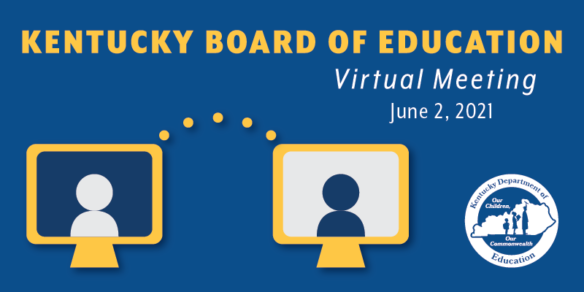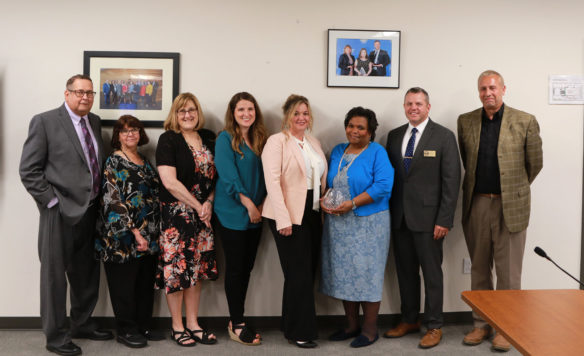 The Kentucky Board of Education (KBE) at its June 2 meeting heard how the preschool per-child funding rates will be impacted due to a decrease in state-funded preschool enrollment during the pandemic, as well as plans to help schools with student recruiting efforts and providing reassurance to parents about in-person services.
The Kentucky Board of Education (KBE) at its June 2 meeting heard how the preschool per-child funding rates will be impacted due to a decrease in state-funded preschool enrollment during the pandemic, as well as plans to help schools with student recruiting efforts and providing reassurance to parents about in-person services.
Each year, the KBE reviews and approves proposed preschool per-child funding rates. A formula is used to provide funding to school districts, and amounts are based on the average number of children served on Dec. 1 and March 1 of the previous academic year.
The state-funded preschool program offers comprehensive services to 3- and 4-year-old children with disabilities and low-income 4-year-old children at or below 160% of the federal poverty level. For a single parent with two children, 160% of the poverty level means a household income of up to $35,136.
Bill Buchanan, program consultant in the Office of Special Education and Early Learning (OSEEL), said there is a standard per-child rate for three categories of enrollment: at-risk, speech delays and developmental delays. There also is a weighted category for 3- and 4-year-olds with severe or multiple disabilities.
Enrollment in state-funded preschool decreased by more than 6,000 students between 2019 and 2020 due to the COVID-19 pandemic, according to Buchanan. There was a significant increase in per-child funding rates between the 2020-2021 and 2021-2022 school years, indicating a significant decrease in enrollment.
Buchanan said that according to a study by the National Institute for Early Education Research, most states reported some drop in enrollment during the 2020-2021 school year. Of those, they recorded a 15% to 41% drop in preschool enrollment due to limited in-person options, concerns about safety and budget cuts.
“I want to be clear today,” said Buchanan. “Kentucky did not cut funding to preschool.”
Buchanan is working with the Early Childhood Regional Training Centers in Kentucky to support schools in recruiting students and providing reassurance to parents about in-person preschool services.
Another challenge for OSEEL is improving school readiness.
“By school readiness, I mean elementary school readiness,” said Buchanan. “All schools must be ready for all children when they arrive in the fall.”
OSEEL’s data shows a significant number of preschool students did not receive the intended benefits of the state-funded preschool program, such as: developmentally appropriate activities, engagement with caring adults in an early childhood setting, providing parents with opportunities to learn about successful transitions to kindergarten and home visits.
Buchanan said KDE also is assisting the Prichard Committee with revisions of The Missing Piece of the Proficiency Puzzle, a document designed to support districts with implementing best practices for parent engagement.
To support teaching and learning practices, OSEEL also is providing training opportunities to kindergarten and preschool teachers on Positive Behavioral Interventions and Supports. At least 12 trainings have been implemented so far, with those opportunities announced through Kentucky Teacher and the Professional Learning Bulletin Board.

Teresa Perry’s family attended the meeting to present the inaugural Teresa Perry Award. Attending were, from left, Eddie Taylor, brother; Judy Taylor, sister-in-law; Dru Hawkins, sister; Emily Ball, daughter; Laura Avant, daughter; winner Janice Harris; Commissioner of Education Jason E. Glass; and David Couch, associate commissioner of the Office of Education Technology.
Photo by Jackie Thompson, June 6, 2021
The Inaugural Teresa Perry Compassion Award
Also at the meeting, Janice Harris was presented with the inaugural Teresa Perry Compassion Award. Harris, who is executive administrative secretary in KDE’s Office of Education Technology, has served Kentucky’s students and teachers for nearly 36 years, 22 of those at KDE.
Harris’ nominator worked with both Perry and Harris and said they “are truly two peas in a pod – angels on Earth, that were and still are great champions of KDE and the smiling and helpful face of our organization.”
Teresa Perry served at KDE as executive secretary to the commissioner of education, and spent over 33 years serving the Commonwealth. She was a positive inspiration and provided outstanding customer service to those inside and outside the agency, and always exhibited compassion. Perry passed away June 9, 2020.
The award named in Perry’s honor is given in June of each year to a KDE employee who exhibits the characteristics and professionalism she carried with her every day.
At KDE, Harris helped provide quality services for special needs and exceptional Kentucky students in KDE’s new Equity Division. For the past 10 years, she has helped KDE staff and all Kentucky K-12 students, along with teachers, school leaders and support staff, by providing KDE’s EdTech services.
Harris is a state leader in the NAACP, works in her church with members in need, mentors hundreds of children and helps care for those with dementia and addiction.
“Like Teresa, Janice represents the best that is within each of us, and what we hope every KDE employee will model in their interaction with other folks in KDE, the districts and the general public,” her nominator said. “Janice lives a life of courage, competence, helping others and compassion. Teresa would be so proud and approving for Janice’s name to be connected with this award.”
“I loved Teresa,” said Harris. “I am very, very honored to be the first recipient of this award. “
Perry’s family attended the award presentation and presented Harris with a glass vase in honor of Perry.
In other business, the board:
- Approved the recipient for the Grissom Award for Innovation in Special Education, which will be present at the board’s August meeting;
- Approved consent agenda items:
- Certification of non-public schools,
- New district facility plans,
- Indirect cost rates, and
- Committee assignment for KBE members Jamie Bowling and Lu Young;
- Heard an update from 2021 Kentucky Teacher of the Year Donnie Piercey on his sabbatical project, Teachers Passing Notes;
- Heard an update from members of the Commissioner’s Student Advisory Council (Anastasia Panaretos, Oldham County Schools; Caleb Bates, Breathitt County Schools; and Anna Williams, Anderson County Schools) on the Kentucky Equity Project;
- Presented the Karem Award for Excellence in Education Policy to Terry Holliday, former Kentucky commissioner of education and chair of the National Board for Professional Teaching Standards;
- Conducted meetings and heard reports from Curriculum, Instruction and Assessment Committee and Operations Committee;
- Appointed Gavin Washington to the Kentucky High School Athletics Board of Control;
- Approved Marion County’s New District Facility Plan;
- Approved a request from Johnson County School District to waive the site improvement cost limitation of 10% of the total project budget as set forth in 702 KAR 4:050;
- Approved the Jefferson County Public Schools 2020-2021 District Tax Rate Levy;
- Approved the 2020 Report, 2020 Exceptions and 2022 Plan as required by 702 KAR 1:115, Annual In-Service Training of District Board Members;
- Approved the 2021-2022 Preschool Grant Allotment and Funding Rates;
- Repealed 704 KAR 7:120, Home/Hospital Instruction;
- Approved 702 KAR 7:150, Home or Hospital Instruction;
- Approved waiver of Section 5(1) of 705 KAR 2:140, Equalization of Funding for Locally Operated Area Vocational Centers and Vocational Departments;
- Heard an update from KDE Chief Performance Officer Karen Dodd on the strategic dashboard;
- Heard an update from KDE Associate Commissioner Robin Kinney and KDE Division Director Karen Wirth on the 2022-2024 biennial budget;
- Heard a financial report from Ashland Independent School District Superintendent Sean Howard;
- Approved an agency amendment to 703 KAR 5:270, Kentucky’s Accountability System; and
- Approved revisions to 703 KAR 5:270, Kentucky’s Accountability System.



Leave A Comment